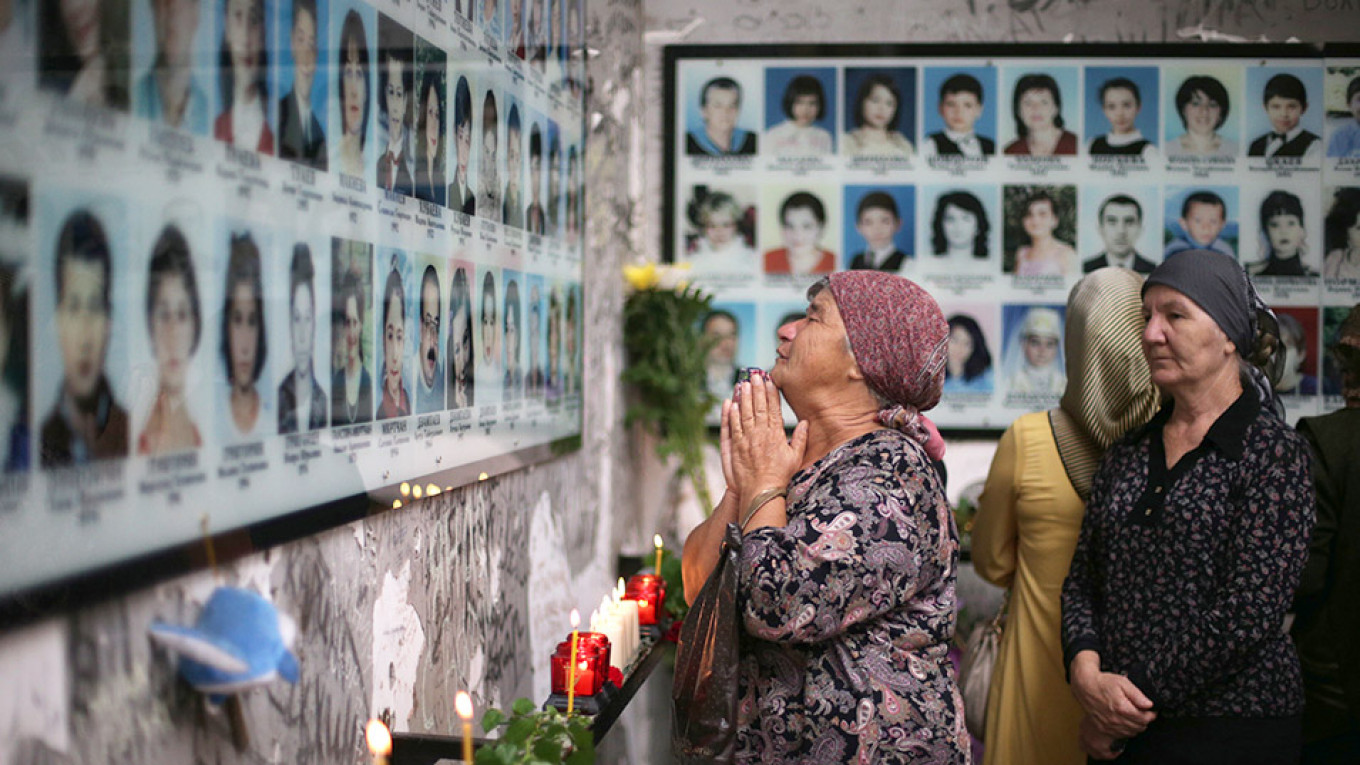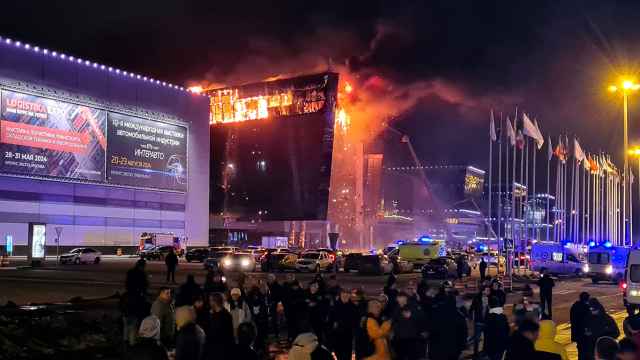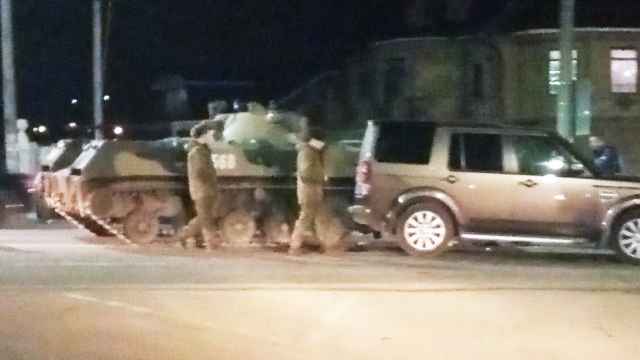When I think of Beslan, I think of Volodya — the first person I interviewed there 15 years ago.
On Sept. 1, 2004, a group of three dozen Chechen-led armed militants took more than 1,100 local residents hostage at Beslan School #1, located in Russia’s North Caucasus. Demanding the withdrawal of Russian forces from Chechnya, they put the hostages — most of them women and children — through hell for 52 hours, abusing them, denying them food and water, and killing several before Russian troops stormed the school. The death toll was 323 hostages, including 186 children. Most were killed during the storming. Volodya’s wife, Zina, and their 10-year-old daughter, Madina, were among them.
I met Volodya in a courtyard near the school’s charred ruins. The heavyset 45-year-old roamed the yard listlessly, his dark eyes glazed over, his face covered in stubble. According to local tradition, men stop shaving when a family member dies. “You want to see her?” he asked. I wasn’t sure what he meant but followed him to his apartment, which was small and eerily still. He picked up a photo-album and we sat together, looking at the photos of Madina — a baby, a toddler, a laughing girl posing for the camera at school, at a New Year’s party, at a dance competition.
“The others who were there made it out. They told me my wife and Madina were at the [school] gym together, till the end. The roof caved in and it all burned...That day [September 3] I was looking for them here in Beslan, in all the hospitals and the morgue — but they weren’t there. I went to Vladikavkaz the next day and found them. They were in the morgue right in the first row. My wife, her face was gone and her body was full of shrapnel wounds. And my Madina, one of her legs was torn off, the other one was hanging by a tendon, her face was all burned. She was unrecognizable. But I did recognize her — by an earring and by her hair — by what remained of her hair.”
Volodya’s monotone continued as he turned the pages. It felt as though his sorrow, so tangible, had sucked all the air out of the room. He could comprehend neither that his wife and daughter were irretrievably gone, nor how the military and the police had failed to protect them and so many others.
A dozen other bereaved Beslan residents I spoke to — every family there was submerged in mourning because each had lost someone at the school — also could not comprehend it. The authorities had received a warning from the security services about the movements of insurgents from neighboring Ingushetia and Chechnya and their apparent plan to carry out an attack “linked to an educational institution” in North Ossetia, but did not respond with any specific security plan. It also appears that they failed to take into account — or give proper weight to — their obligations to respect the rights and wellbeing of the hostages when planning their operation. Instead of prioritizing saving the lives of the helpless hostages trapped inside the school, the troops used indiscriminate force that focused on destroying the terrorists.
They certainly succeeded in that, killing all but one of the terrorists, who later stood trial and is now serving a life sentence. But the hostage death-toll was staggering and included over 100 who burned in the school building, which the troops pummeled with tank fire, grenade launchers and flame throwers, without even attempting to put out the fire.
For years, local activists have argued in Russian courts that the authorities were responsible for the deaths of many hostages. When Russia’s judicial system failed them, they sought justice at the European Court of Human Rights. In April 2017, the court delivered its ruling, finding the Russian government responsible for violating the right to life, including “the use of lethal force by security forces,” and for failing to provide victims an effective legal remedy.
The court concluded that the government failed to take adequate “preventive measures,” despite having had sufficient information about an allegedly planned attack. It also found that while preparing and carrying out the intervention, the authorities did not prioritize minimizing harm to the hostages, which contributed to the casualties. Nor did they provide “satisfactory and convincing explanation” of the use of force and the circumstances of the deaths and injuries of the hostages. “The primary aim of the operation should be to protect lives from unlawful violence. The massive use of indiscriminate weapons stands in flagrant contrast with this aim,” the court said.
The government paid the complainants close to 3 million euros in compensation. When commenting on the ruling, Ella Kesava, a prominent activist from Beslan whose daughter was among the hostages, emphasized that the recognition of responsibility was a “victory” for Beslan’s grieving community. Though those they lost cannot be returned, at least they attained a sense of justice.
I don’t know whether Volodya was among the applicants and I have not been back to Beslan for a very long time. But his glazed eyes and ghastly monotone have been haunting me for 15 years. For the nightmare of Beslan never to be repeated, its lessons must be learned.
A Message from The Moscow Times:
Dear readers,
We are facing unprecedented challenges. Russia's Prosecutor General's Office has designated The Moscow Times as an "undesirable" organization, criminalizing our work and putting our staff at risk of prosecution. This follows our earlier unjust labeling as a "foreign agent."
These actions are direct attempts to silence independent journalism in Russia. The authorities claim our work "discredits the decisions of the Russian leadership." We see things differently: we strive to provide accurate, unbiased reporting on Russia.
We, the journalists of The Moscow Times, refuse to be silenced. But to continue our work, we need your help.
Your support, no matter how small, makes a world of difference. If you can, please support us monthly starting from just $2. It's quick to set up, and every contribution makes a significant impact.
By supporting The Moscow Times, you're defending open, independent journalism in the face of repression. Thank you for standing with us.
Remind me later.








